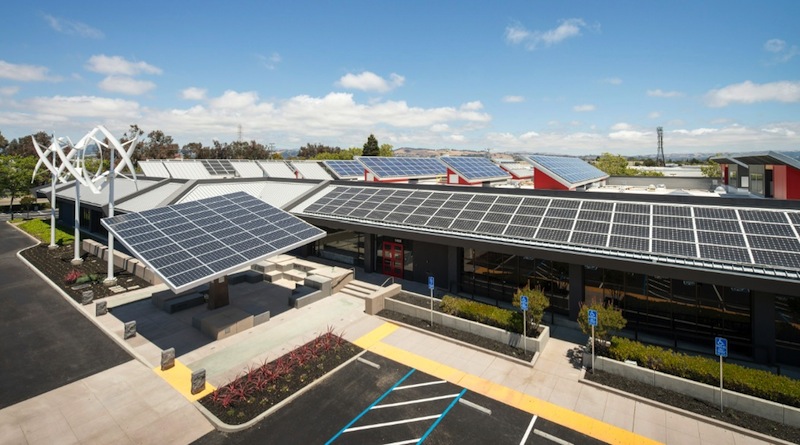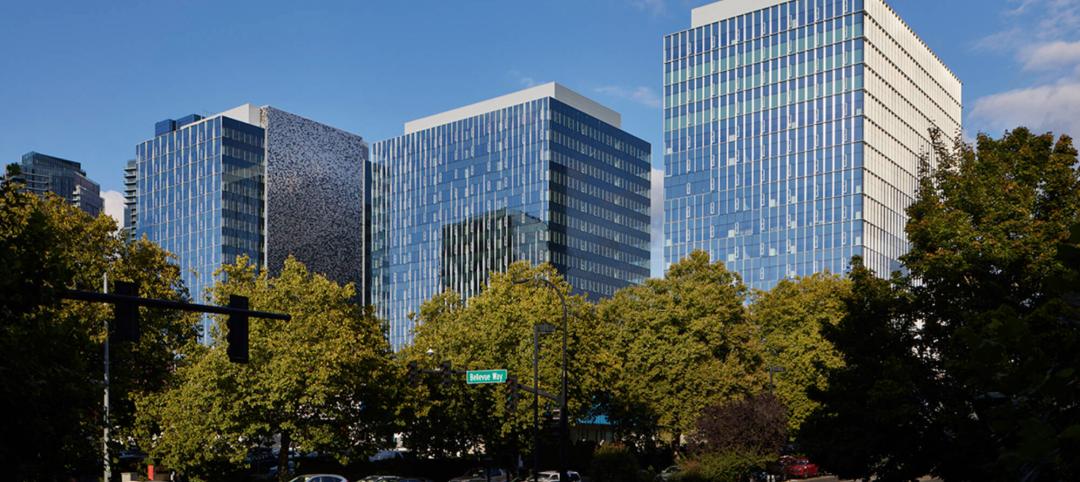The International Brotherhood of Electrical Workers and the National Electrical Contractors Association announced the grand opening of the Zero Net Energy Center (www.znecenter.org).
Located in San Leandro, Calif., the ZNE Center is the first commercial building retrofit designed to meet the U.S. Department of Energy’s requirements for a “zero net energy” building.
The 46,000-sf structure is an educational facility for 2,000 electrical workers that will participate in a program run by IBEW Local 595 and the Northern California Chapter of NECA. The ZNE Center officially opens its doors as the educational facility for over 2,000 apprentice and journey-level electricians in Alameda County and to serve as an industry-wide resource.
Courtesy Environmental Building Strategies (EBS). CLICK IMAGE TO ENLARGE.
“The building is a true game changer for our industry,” said Victor Uno, Business Manager for IBEW Local 595. “We are proud to push the envelope in the areas of energy conservation efforts, renewable energy promotion, job creation, work-force training and labor-management cooperation.”
Energy Efficiency and Renewable Energy
The ZNE Center exceeds the state of California’s 2030 energy efficiency effort by meeting the zero net goal 17 years in advance. It also exceeds the energy conservation goals of the Obama administration’s Better Buildings Challenge.
“We look forward to sharing how we utilized new technologies, advanced building designs, and innovative construction methods to achieve a dramatic and unprecedented 75% reduction in energy use when compared to similar existing commercial buildings in the country," said Don Campbell Executive Director of NECA’s Northern California Chapter. “This energy savings lowers the ZNE Center’s carbon footprint by 175 tons of CO2 per year, equal to the carbon emitted by 30 passenger vehicles annually as well as a savings of 500 barrels of oil each year.”
The ZNE Center exemplifies the importance of deep and early collaboration of the entire design and construction team. Under the leadership of IBEW/NECA, the team included Environmental Building Strategies (EBS), NOVO Construction, FCGA Architects, Belden Consulting Engineers, Red Top Electric, ACCO Mechanical, and Cubed Energy Solutions.
Project overview and sustainability stats
· The ZNE Center is the new home of the IBEW Local 595 and the Northern California Chapter of NECA Joint Apprenticeship and Training Committee program, where apprentices will train on the renewable energy and passive design systems incorporated into the building.
· Their goal is to make the ZNE Center the hallmark of energy efficiency and training for the construction industry nation-wide, incorporating a vision for a more sustainable world where young men and women will be trained for good paying jobs and careers in the electrical industry.
· The 46,000-sf building is the first retrofit of an existing commercial building for education and training that meets the U.S. Department of Energy standards for a “zero net energy” building. It exceeds California’s 2030 zero net energy goal 17 years in advance, and also exceeds the goals of Obama’s Better Buildings Challenge.
· 50% lighting energy reduction through daylighting, occupancy sensors, LEDs, solar tubes and more
· 80% HVAC energy reduction
· 90% computer energy reduction by upgrading equipment to Energy Star certified
· 75% reduction in energy use compared to similar U.S. buildings, and 29% energy use reduction compared to new commercial construction in California.
Related Stories
AEC Tech Innovation | Oct 8, 2024
New ABC technology report examines how AI can enhance efficiency, innovation
The latest annual technology report from Associated Builders and Contractors delves into how artificial intelligence can enhance efficiency and innovation in the construction sector. The report includes a resource guide, a case study, insight papers, and an essay concerning applied uses for AI planning, development, and execution.
Healthcare Facilities | Oct 8, 2024
Herzog & de Meuron completes Switzerland’s largest children’s hospital
The new University Children’s Hospital Zurich features 114 rooftop patient rooms designed like wooden cottages with their own roofs. The project also includes a research and teaching facility.
Mixed-Use | Oct 7, 2024
New mixed-use tower by Studio Gang completes first phase of San Francisco waterfront redevelopment
Construction was recently completed on Verde, a new mixed-use tower along the San Francisco waterfront, marking the end of the first phase of the Mission Rock development. Verde is the fourth and final building of phase one of the 28-acre project that will be constructed in several phases guided by design principles developed by a design cohort led by Studio Gang.
Brick and Masonry | Oct 7, 2024
A journey through masonry reclad litigation
This blog post by Walter P Moore's Mallory Buckley, RRO, PE, BECxP + CxA+BE, and Bob Hancock, MBA, JD, of Munsch Hardt Kopf & Harr PC, explains the importance of documentation, correspondence between parties, and supporting the claims for a Plaintiff-party, while facilitating continuous use of the facility, on construction litigation projects.
Glass and Glazing | Oct 7, 2024
Pattern language: An exploration of digital printing on architectural glazing
Architectural Glazing has long been an important expressive tool which, when selected and detailed thoughtfully, can contribute to the successful transformation of architectural concepts to reality.
University Buildings | Oct 4, 2024
Renovations are raising higher education campuses to modern standards
AEC higher ed Giants report working on a variety of building types, from performing arts centers and libraries to business schools. Hybrid learning is seemingly here to stay. And where possible, these projects address wellness and mental health concerns.
AEC Tech | Oct 3, 2024
4 ways AI impacts building design beyond dramatic imagery
Kristen Forward, Design Technology Futures Leader, NBBJ, shows four ways the firm is using AI to generate value for its clients.
Laboratories | Oct 2, 2024
Trends in scientific research environments: Q&A with Flad's Matt McCord
As part of an ongoing series, Matt McCord, AIA, NCARB, LEED AP BD+C, Associate Principal with Flad Architects, discusses the future of the scientific workplace.
Museums | Oct 1, 2024
UT Dallas opens Morphosis-designed Crow Museum of Asian Art
In Richardson, Tex., the University of Texas at Dallas has opened a second location for the Crow Museum of Asian Art—the first of multiple buildings that will be part of a 12-acre cultural district. When completed, the arts and performance complex, called the Edith and Peter O’Donnell Jr. Athenaeum, will include two museums, a performance hall and music building, a grand plaza, and a dedicated parking structure on the Richardson campus.
Data Centers | Oct 1, 2024
10 biggest impacts to the data center market in 2024–2025
While AI sends the data center market into the stratosphere, the sector’s accelerated growth remains impacted by speed-to-market demands, supply chain issues, and design innovation necessities.



















